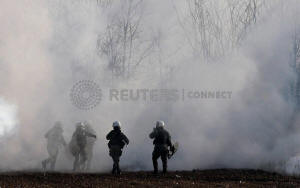Migrants dodge tear gas as Greek-Turkish border crisis deepens
 Send a link to a friend
Send a link to a friend
 [March 06, 2020]
By Lefteris Papadimas and Joseph Nasr [March 06, 2020]
By Lefteris Papadimas and Joseph Nasr
KASTANIES, Greece/PAZARKULE, Turkey
(Reuters) - Migrants stuck on the Turkish side of the border with Greece
tried to dodge tear gas canisters on Friday as a tense standoff between
Greek and Turkish security forces entered a second week with no sign of
abating.
Tens of thousands of migrants are attempting to cross from Turkey into
the European Union after Ankara said on Feb. 28 it would no longer try
to keep them on its territory under the terms of a 2016 accord with
Brussels in return for EU aid.
Thick smoke from the tear gas canisters wreathed the border posts at the
Kastanies/Pazarkule crossing. A Reuters reporter saw Greek forces use a
water cannon to try to disperse migrants, only to be met by a volley of
tear gas from the Turkish side.
"The attacks are coordinated by drones. Apart from intimidation, these
attacks are taking place from the Turkish police to help migrants cross
the fence border line," a Greek government official said.
Turkey has said any tear gas fired is in response to tear gas fired from
the Greek side.

Athens has called the confrontations a threat to national security and
Prime Minister Kyriakos Mitsotakis brought European Union leaders to the
border area to press his case for more financial and logistical support
to avoid a repeat of 2015, when more than one million refugees poured
into the EU from Turkey.
Greece says it has repulsed around 35,000 migrants trying to cross its
border in the past week. Turkey has deployed 1,000 special police to the
area to halt the pushback of migrants onto its territory.
Ankara accused Greek forces this week of shooting dead four migrants, a
charge rejected by Athens, which says Turkish forces are actively
helping the migrants to cross the border illegally.
"THEY WON'T LET US IN"
On the Turkish side of the border on Friday, enterprising villagers were
selling fruit, vegetables and bottled water to migrants, though they
also expressed sympathy for them.
"I hope they will open this border soon and end this tragedy. We just
want to get on with our lives," said Remiz Celik, 43, who was selling
apples and potatoes to migrants.
The fields were strewn with plastic bags and other detritus left by the
migrants, many of whom have been living in Istanbul and other Turkish
towns and cities for some time.
[to top of second column]
|

Greek riot police officers walk amid clouds of tear gas near
Turkey's Pazarkule border crossing, in Kastanies, Greece March 6,
2020. REUTERS/Florion Goga

Some migrants said they might head back to Istanbul in the coming
days because they do not expect the Greeks to yield.
"They are not going to let us in, we know this, because the Greeks
know that if they open the gates they will get many more people on
this side of the border," said Fawzi Uzbek, 37, an Afghan national
who has lived in Istanbul for about 18 months.
Sitting in a makeshift tent he had constructed near the border for
himself, his wife and four children, Uzbek said he wanted to find
work in Germany and had begun learning German, but said he would
probably return to Istanbul soon.
About a quarter of the migrants at the border are Syrian and most of
the rest are Afghans, Pakistanis, Iranians and Africans, according
to Turkish estimates.
European Union foreign ministers were due to discuss the crisis at
Greece's border at a gathering in Croatia on Friday.
"We have clear evidence that this population movement has been
created and orchestrated by Turkey. I want to be clear the European
Union will not let this human pain be exploited," Greek Foreign
Minister Nicos Dendias said as he headed to the meeting.
Turkey, which already hosts 3.6 million refugees from the Syrian
civil war, says it cannot take in any more people and says the EU
has failed to provide sufficient financial and other support.

"Turkey has a big burden ... and we have to understand that. But at
the same time, we cannot accept that migrants are being used as a
source of pressure," the EU's foreign policy chief Josep Borrell
said ahead of Friday's talks in Zagreb.
(Additional reporting by Renee Maltezou and George Georgiopoulos in
Athens; Editing by Gareth Jones)
[© 2020 Thomson Reuters. All rights
reserved.] Copyright 2020 Reuters. All rights reserved. This material may not be published,
broadcast, rewritten or redistributed.
Thompson Reuters is solely responsible for this content. |